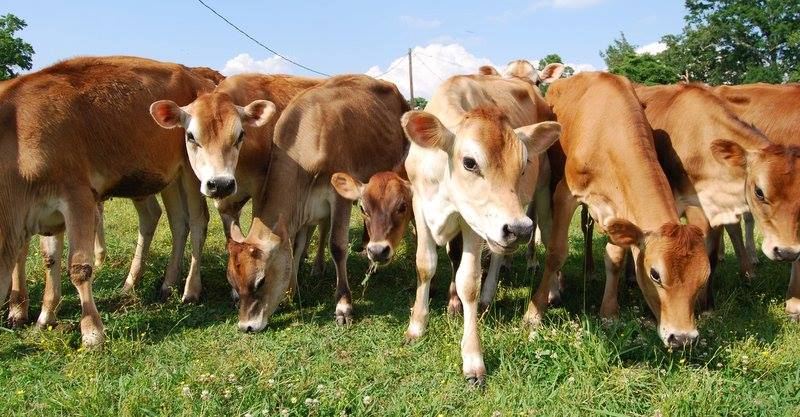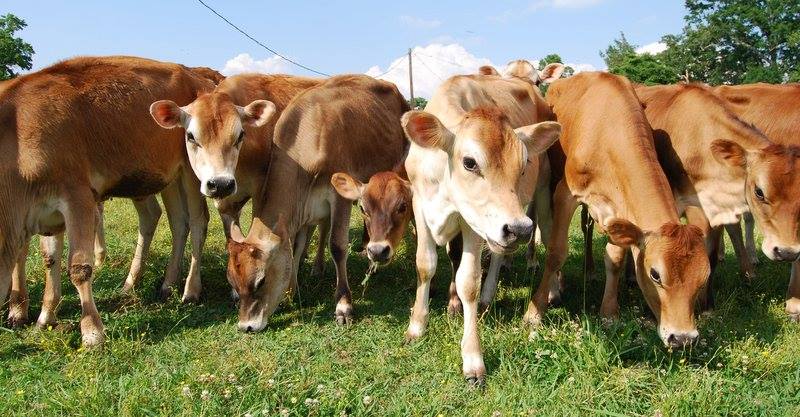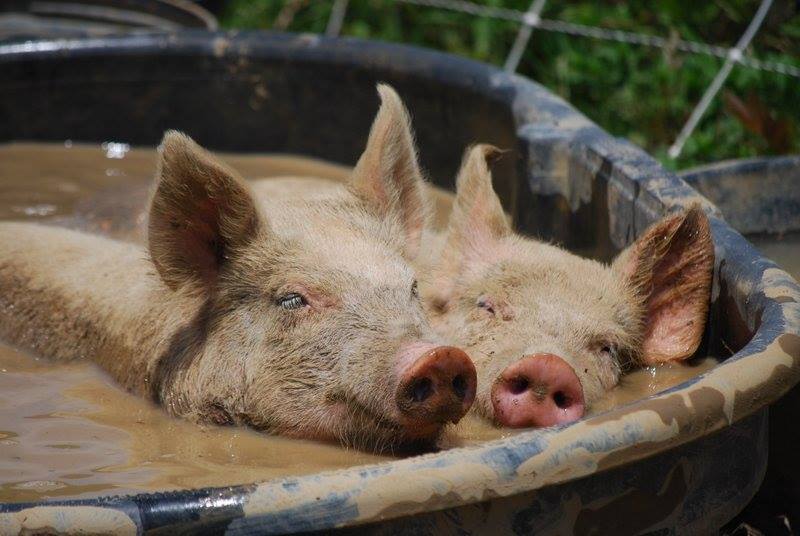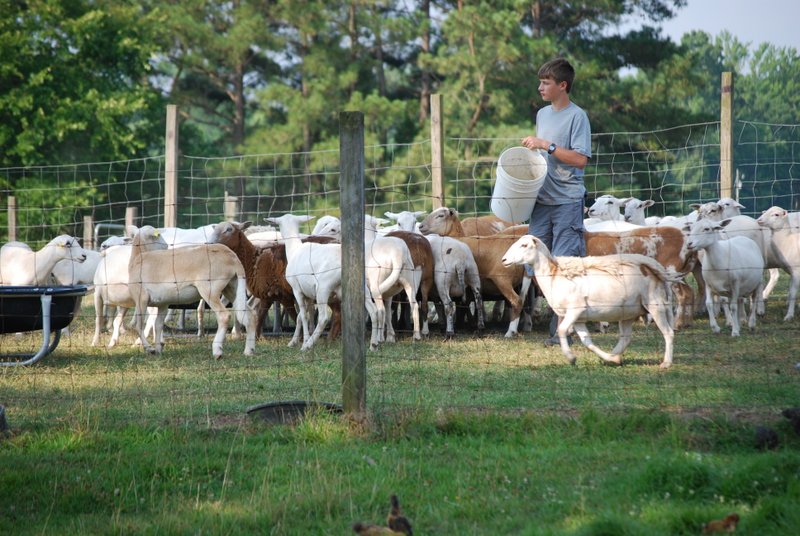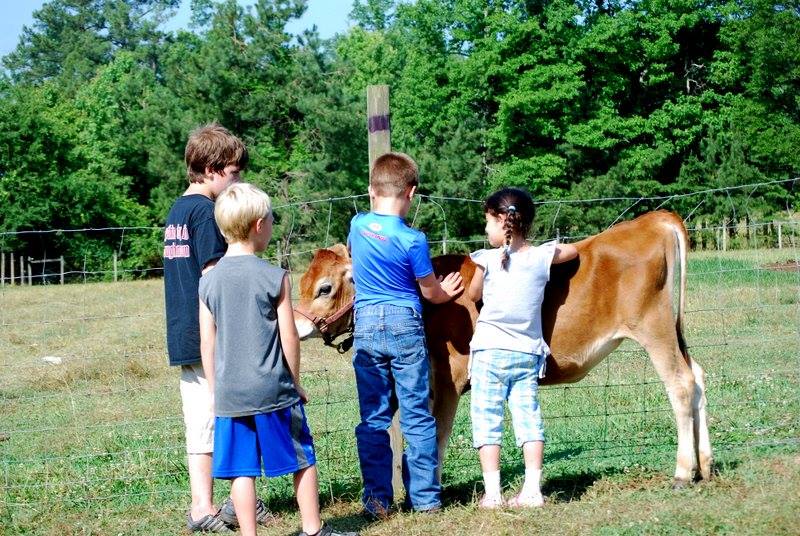by Samantha Gasson, Bull City Farm | July 27, 2015 –
1. Pasture-raised meats save and improve farmland.
Farming of any type helps preserve farmland and open spaces. We’re obviously a bit biased but we feel strongly that there is something about open space that resonates in the hearts of most people. In an urban county like ours (Durham), it is even more crucial to ensure as much land as possible remains undeveloped. Whether it’s row crops, pasture, or tobacco, as long as there is money to be made farming, there will be someone willing to get their hands dirty, provided they can afford to get started. Commodity farming can be profitable on large tracts of land, but going forward it’s the niche farmer who’s going to make the difference in urban counties like our own. Those of us selling directly to the consumer have the potential to start cheap and earn more per acre, which allows us to farm on a scale that works for us. It provides the flexibility to raise animals in a way that we feel good about and in a way that we feel is better for the environment.
2. Pasture-raised meats are better for you.
If you’ve ever bought grass-fed meats you’ve probably heard from your farmer about the health benefits of grass-fed versus feed-lot finishing. The health benefits are real and well documented (here, for instance), but even if you aren’t willing to delve into the world of omega-3 fatty acids and conjugated linoleic acid understand this: grass-fed meats tend to be leaner and therefore lower in calories. Eat the same quantity of grass-fed meat next year versus last year’s grain-fed and if your consumption is about the national average you’ll lose a few pounds.
What about the animals that can’t be grass-fed? Animals like chickens and hogs need more than a grass diet but still benefit hugely from the added sunlight, fresh air and forages available on pasture. A chicken given the opportunity to snack on grass and bugs has beautiful orange-yolk eggs rich in beta-carotene. Hogs (particularly the heritage breeds) grown slowly on pasture produce a leaner cut of meat that carries with it the flavor of how and where they were grown. Did we mention the flavor? There’s more to your health than just the physical.
3. Pasture-raised meats are a good alternative for people concerned about animal welfare.
Your local farmers take their jobs as stewards of the land and their animals very seriously. They have to if they want to stay in business because it matters to you. As an educated consumer, it’s good to ask your farmer how they raise their animals. Have they gone to the effort of obtaining a 3rd party audit like Animal Welfare Approved to document their commitment to their animal’s wellbeing? How do they handle winter weather, the summer sun (ask about the weather, we dare you), or stressful times like the end of life or birth? On our farm, for instance, we leave our lambs with their mothers until well after (they should be) weaning, we don’t use artificial lighting to keep our chickens laying through the winter so they get the winter break nature intended and our pigs are never ringed allowing them to root freely.
We treat our animals with the respect they deserve and when it’s time for the end of their lives, we make the transition as stress-free as possible. It’s important to the quality of the finished product (stress is not good for flavor) but it’s also important to acknowledge why they are here for us to enjoy. We owe their existence to the generations of people who bred them for the purpose to which they are put. Without this purpose, they would never have been born. It is a heritage and tradition that demands respect. The animals deserve respect.
4. Pasture-raised meats preserve heritage breeds and the history of animal production.
One of the things we enjoy most is looking back to the wisdom of our forefathers for insight into what might work best for us today. We like to think we’re on the cutting edge of old technology. The niche protein farmer has a different agenda than the commercial one; we want the animal that does the best on grass or the hog that gains weight on pasture with minimal input. We want the hen that would rather chase bugs than eat pellets yet remains productive.
Over time we have gravitated towards breeds that are little changed by the demands of modern agriculture. Heritage breeds. They are a testament to the resourcefulness of our ancestors and very well suited to the fiscal demands of small-scale farming in the modern world. Full circle.
5. Pasture-raised meats are well worth the extra cost.
It’s more expensive to raise animals the way we do. We don’t buy feed by the rail car or process thousands of animals per year. Land is expensive around here. The efficiencies of mass production are always going to remain beyond our reach. We’re OK with that. It’s not who we are. Our goal is to produce good food that we want to eat. We started out growing for our family and realized there were enough like-minded folks out there to make a go of it. Maybe feed a few people. Good food raised right. We think it’s worth it.
Bull City Farm is located in Northern Durham County where they raise kids, cows, sheep, laying hens and ducks plus hogs, all on pasture. Their commitment to the land and their animals is what drives them as they continue to improve their approach to small scale farming and production.


